
The writ has dropped which means there is a Federal Election on the way. Candidates are campaigning fiercely for your vote, and it is important that they know that Fetal Alcohol Spectrum Disorder (FASD) is a priority for you.
There are many social, political, economic, and environmental issues that are currently competing for their candidate’s attention. FASD is an issue that has not had the attention it deserves in previous elections. We need your help to get FASD on the radar this election.
How can you help?
The number one thing you can do to help is connect with your local candidates. Find out who is campaigning for your vote and reach out to them via email, phone, social media or via handwritten letter. Attend local and virtual events and ask questions about FASD, and answer your door during canvassing efforts.
Ask them what they are doing to address FASD in Canada and to support the 1.5 million Canadians with this disability. Ask them to express their support for a National FASD Strategy.
The second most important thing you can do is encourage your friends and family members to do the same. The more people that reach out to their local candidates, the more important they believe an issue is to their voters and the more likely they will be to bring it to the attention of their policy leaders.
Why is this important?
Candidates are elected by you, the people living in their ridings. They are more likely to champion an idea or an issue if it’s something that they believe their constituents care about. The more people that reach out about a specific topic, the more likely they are to see it as a widespread issue and bring it to the attention of other people within their party.
Three or four letters may be enough in a small riding, but thousands of letters and calls to politicians makes an issue hard to ignore. If you are a member of an FASD organization or clinic, encourage everyone in your organization to reach out to their candidates. Host a letter writing event or have people call into their candidates during their workday, lunch periods, or break times.
What should you say?
Tell your candidate that you are a voter in their riding. They are more likely to listen to you if they think you may vote for them.
Ask them to support a National FASD Strategy, and to do so publicly. FASD is really complex and there are many different supports and services that people all across Canada need. Some things are the responsibility of provincial and territorial governments, while others are the responsibility of the federal government. We don’t want to give politicians the idea that the disability is too complex to address or that FASD is a “provincial responsibility”. Keep your comments and requests centered around a National FASD Strategy.
Ask them questions about FASD. Some questions might include:
- What will you/your party do to address FASD in Canada?
- The Federal government has previously funded the development of a National Autism Strategy. FASD is 2.5 times more common than Autism. Will you support the development of a National FASD Strategy in Canada?
- Is supporting people with FASD and their families part of your party’s platform?
- Will your party support the Canada FASD Research Network in their work to generate evidence to inform policy and improve outcomes for individuals and families with FASD?
- If your party forms the next government, how will you encourage federal ministries, including health, education, justice, corrections, and social services, to work together to address the complexities of FASD?
- With alcohol consumption and mental health challenges in women increasing due to COVID-19, how do you plan to address the potential for increased alcohol-exposed pregnancies and future cases of FASD?
- How is your party increasing awareness of the harms of alcohol, including FASD?
What next?
The third most important thing is to let us know. Did you have a positive experience connecting with one of your candidates? Did a politician agree to support a National FASD Strategy? Tell us! We can follow up with this person later to see what they’re doing to support FASD in the future.



